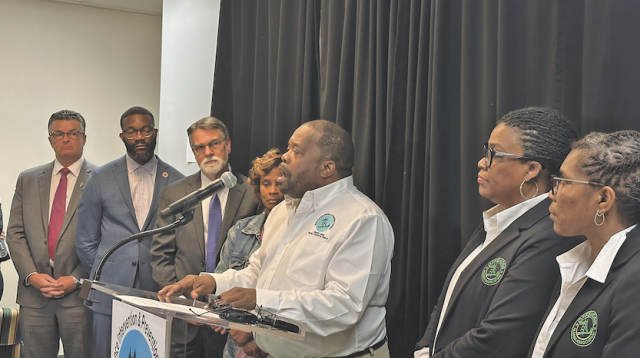
By Ryan Michaels
The Birmingham Times
Seven gunshot victims in Jefferson County are recovering in a new program which provides access to relocation, counseling and other social services while the victims are still in the hospital, said the Offender Alumni Association (OAA), a Birmingham nonprofit which runs the program.
The year-long pilot program — Violence Intervention and Prevention Partners, or VIP2 — provides specialists who monitor survivors’ progress over time and also coordinate with the outpatient clinical team for follow-up once the patient is discharged, officials said on Wednesday.
“We become, not just VIS (violence interruption specialists)—we become friends with intention, and these intentions are to make their life the best that they want,” said Timothy Lanier, one of the specialists involved in the Violence Intervention and Prevention Partners Program (VIP2).
Patients who are Jefferson County residents between the ages of 19-39 and who have survived a non-self-inflicted gunshot injury receive services from VIS.
OAA received a $1.1 million grant in 2022 awarded by the Jefferson County Department of Health (JCDH) as service provider. The city of Birmingham has committed $2.1 million for years two and three of the program.
The University of Alabama at Birmingham (UAB) Hospital is the pilot facility for the program. The UAB Division of Trauma and Acute Care Surgery identifies and refers consenting patients to VIP2.
Carmone Owens, supervisor for the VIS team, said life “is never quite the same after a gun violence episode in someone’s life.” When a patient has consented to be part of the program, a member of the VIS team will figure out what happened and what’s needed, he said.
“Then we go from there to setting up an action plan,” Owens said. “Before they get discharged from the hospital, what are the primary needs they have? What are the primary things that need to change, and what are the things that are going to make them feel safe and help with their recovery?”
Those needs could include helping victims with improved employment opportunities, as well as counseling, relocation, child care or anything else a victim might need.
Deborah Daniels, co-founder and executive director of OAA, said the vision of the organization is “to reduce crime and restore our communities.”
“OAA realizes that violence never has a winner and that it never affects one person. It destroys families and communities,” said Daniels, who previously struggled with recidivism.
The VIP2 program will show the power of unity, she continued. “It is designed to demonstrate that through unity, all of us, all of us working together, we can, we will and we must address gun violence because where there is unity, there is victory,” Daniels said.
Mark Wilson, Jefferson County Health Officer, said national data has shown that five years after gunshot, 20 percent of victims will be dead, and more than 40 percent will have been re-hospitalized from a violent injury.
Throughout the program, trends and individual results will be monitored to ensure “desired outcomes” are being met, said the Health Officer.
“As long as we’re meeting those outcomes, we are committed to continuing to fund it, and our hope is that because this is an evidence-based program, and if we can show some results, that we’ll be able to get additional funding,” Wilson said.
Dr. Jeffrey Kerby, director of UAB’s Division of Trauma and Acute Care Surgery, said that firearm injury has become the number cause of death for Americans from birth to 25 years. VIP2 is one of more than 40 hospital-linked violence intervention programs that have been started across the country, Kerby said.
“While this is not a total solution to the epidemic of firearm injury in our community, it is a vital component of an overall community violence intervention strategy, and we are excited to be a part of it,” Kerby said.
Mayor Randall Woodfin said VIP2 is one of multiple tools in the city’s toolbox for combating violence and its effects.
“Enforcement via Birmingham police alone cannot reduce violent crime, in isolation or by themselves. As a city, we’ve been moving intentionally about creating community-based partnerships to continue to address the root cause of crime, and particularly with gun violence,” Woodfin said.
Birmingham City Councilor LaTonya Tate, who chairs the council’s Public Safety Committee, said improving the situation for families in Birmingham requires a “multi-faceted ecosystem.”
“When gun violence impacts the community, nobody’s sending a therapist, the healers, all of those people back into the community, because the impact is still there, so we have to deploy counselors, therapists, restorative people back into the community to fix the impact that’s there, alongside the people that have been hurt by gun violence,” Tate said.
The gun violence problems in Birmingham aren’t going to be solved “overnight,” Tate said.
“We all have to play our part from the clergy, from the business person, from the school system—everybody has to come together to build this ecosystem out, to come to what we see as community safety,” Tate said.
OAA is located at 1000 24th Street South, Birmingham, AL 35205. For more call (205) 916-0123 or visit oaa@offenderalumni.org




